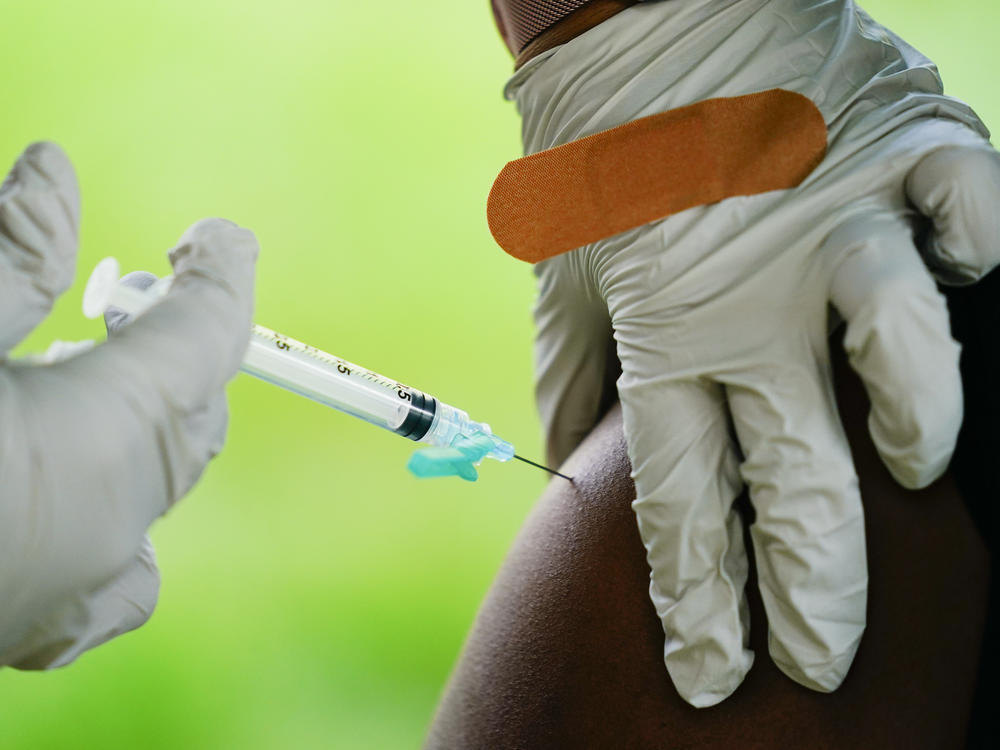
Caption
A health worker administers a dose of a Pfizer COVID-19 vaccine during a vaccination clinic at the Reading Area Community College in Reading, Pa., Tuesday, Sept. 14, 2021.
Credit: AP Photo/Matt Rourke
|Updated: August 23, 2024 9:29 AM

A health worker administers a dose of a Pfizer COVID-19 vaccine during a vaccination clinic at the Reading Area Community College in Reading, Pa., Tuesday, Sept. 14, 2021.
Caroline Nickel said she and her husband contracted COVID in mid-July.
“Our son and his wife were in L.A. for a week, flew home feeling ill, son tested positive and had Paxlovid,” Nickel said, referring to the common COVID-19 treatment. “I think his was covered by insurance.”
Paxlovid is a prescription medicine used to treat mild-to-moderate COVID‑19 in adults who are at high risk for progression to severe COVID‑19, including hospitalization or death, but Paxlovid is not approved for use as pre-exposure or post-exposure treatment for prevention of COVID‑19.
Three days later, the older couple tested positive and spent the following month taking over-the-counter cough medicine and feeling weary.
Nickel said she keeps up with testing because she had COVID twice last year.
“I’m always trying to make sure it’s not COVID,” she said. “Also, I guess doctors don’t do the test unless you ask — from my experience with my last two sick visits.”
Chances are, you know someone in Georgia who recently called out of work or took the day off school because they didn't feel well.
Whether or not someone has paid sick time, arranging schedules on account of illness is frustrating enough without the added malaise and exhaustion.
Local Facebook community group members say doctors are seeing new COVID cases causing flu-like illness, but flu season doesn't officially begin until October.
"That is right," a Cherokee County resident posted on Facebook. "I had it in June, no fever. Throat and sinuses never would have assumed COVID, but it was."
Several people who prefer not to be named said they received $300-plus bills after visiting urgent care clinics for COVID testing and treatment. Medical billing experts recommended looking up the insurance billing code to understand what the charges cover. Walgreens and CVS Minute Clinics charge an assessment fee regardless of diagnosis.
Plans and deductibles vary so no one experience will hold true for everyone in Georgia, but Paxlovid is available free through the end of the year.
Seasonal flu viruses are among several viruses contributing to respiratory disease activity, according to the Centers for Disease Control and Prevention, which provides updated, integrated information about COVID-19, flu and RSV activity on a weekly basis.
At least 35 million illnesses, 400,000 hospitalizations, and 25,000 deaths from flu have been reported to the CDC so far this season.
Back-to-school time traditionally brings as much sickness and malaise as it does a chance to catch your breath after getting the kids back on track outside the house.
Georgia's Department of Public Health tracks flu activity throughout the state and reports the findings between October and May each year, and epidemiologists with the state recommend protecting yourself and others around you with an annual flu shot that supports the immune system through the December/January time frame.
The current strain of rising COVID cases is associated with the omicron variant, which caused over 1 million COVID cases in fall 2021 but is no longer circulating. However, its subvariants are now driving most of the country’s SARS-CoV-2 infections.
The new COVID vaccines are designed to keep the shots up to date with the virus, which keeps evolving to evade our immune systems.
Many people question whether they really need a booster vaccine, especially those who have previously had COVID.
“Anyone who wants to get this vaccine should get it,” said Dr. Paul Offit, a vaccine expert at the University of Pennsylvania who advises the U.S. Food and Drug Administration. “It certainly makes sense why someone would want to get it because it lessens your chance of getting a mild or moderate infection for about four to six months and to some extent lessens your chances of spreading the virus.”
But the calculation could be different for younger people.
“Were I a 35-year-old healthy adult who’d already had several doses of vaccine and one or two natural infections, I wouldn’t feel compelled to get it,” Offit said.